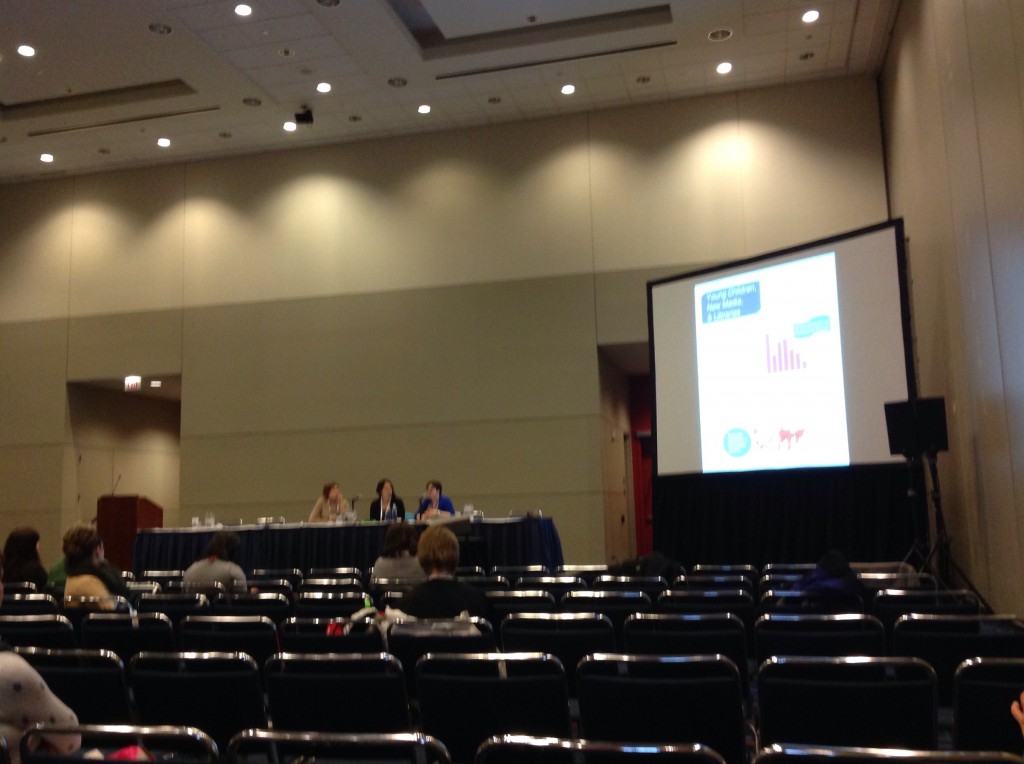Sunday afternoon was a very interesting session talking about a survey that was done about using new media in libraries with young children. Here are my notes:
Young Children, New Media, & Libraries
Liz Mills
Amy Koester
Julie Roach
(ad lib panel because of storm)
Liz: A survey was done from littleelit.com — use of new media with young children in libraries. Role of children’s librarian with new media.
Wanted an initial snapshot of technology use in libraries. Esp programming for ages 0-5.
Wanted to cast as wide a net as possible.
What’s the landscape in public libraries?
To what extent is tech being used in libraries?
What kind of funding/selection strategies?
Def: New media is digital technology, particularly tablet-based. Esp looking at children ages 0-5.
More than 400 responses in 18 days.
Looked at how new media was being used in programming
40% using devices in storytime
31% using devices in programming that is not storytime
26% had devices available for check out.
Most popular: Tablets
Largely funded by library’s operational budgets
2nd was grants and donations.
Also staff used personal devices.
Respondents did consult some type of outside resource.
Will be increasing availability and use.
Not all responses were positive.
Saw some pushback. Some don’t believe tablets are good for young children.
Reasonable to conclude that this is still an important topic to investigate.
Survey sets the stage for a larger discussion around media mentorship.
Amy:
Interesting similarities between libraries and families using new media.
2013 – 75% of households use new media. 71% of libraries.
40% of families with children 8 and younger own some sort of tablet and their children have used it. 39% of libraries have used tablets in storytime.
Libraries compare well with families in 2013.
Prevalence of families who use digital media continues to go up.
Only 22% of libraries are offering some sort of mentoring on media.
Mentoring on media is what we youth librarians do.
Digital media is just a new form of what we’ve always been doing.
Main implications of survey data: We need digital media mentoring in libraries.
A media mentor is a person who is knowledgeable about recommendations of how children and families use media and supports decisions. We can refer them to experts and give them the information.
Every library needs to have a commitment to meeting families where they are.
We should be familiar with different policy statements — and provide access to the best resources possible.
AAP, Fred Rogers Center, Joan Ganz Cooney Center at Sesame Workshops, Erikson Institute — these have done the research and laid out their positions.
Know your resources and share them with families.
Recognize this is a vital way we can serve families.
Library Schools should include this in their discussions with future Youth Librarians.
Julie (Moderator): What initial steps would you take in leading people to be a media mentor?
First step: Identify key resources and make sure staff have an opportunity to read and discuss these resources.
We’d need to remember our role as objective information providers.
Whatever our own personal convictions, it’s up to parents to make the decisions for their families — we need to give them objective information
Liz – at U of Washington, they are preparing a new class about that.
Making students aware of what the landscape is.
Helping students realize they don’t have to be an expert. Talk with the family. Find out what they’re looking for — a Reader’s Advisory/ Reference Interview
What surprised you most from the survey results?
Amy: Surprised by how high the numbers are on current use.
Liz: Curious about the <5000 population libraries. Excited about the 58% who plan to increase use.
Amy: It’s not a tech or no-tech issue.
Julie: Any lessons learned from the survey?
Liz: Would have asked more questions. Really broad swathes.
Amy: Looking at the data in different ways, going in as deeply as possible.
Julie: Any tips for developing media mentors?
Amy: We need general acknowledgement that this is an issue that every library serving youth and families is facing every day.
Emphasize to our managers and policy-setters that we are encountering this and it is important. We need a commitment to explore these issues.
There’s power in a large group of people working toward the same goal.
Liz: Openness and flexibility. Another way in which people are consuming information. Not replacing books.
Question about digital divide. Libraries having tech — how is that related to the income of the families they serve? A follow-up question.
Provides an extra facet to where media mentorship can come in.
Blogs like littleelit and storytimeunderground
More and more research is going on and tied to policy statements. Look at this as a potential research topic.
This area is changing quickly. We need to do a lot to capture what’s happening and think critically about that.
Look for commonalities in the work that’s already being done in making media mentors.
In the same way we can do readers’ advisory in areas we’re not familiar with, we can learn the resources.
